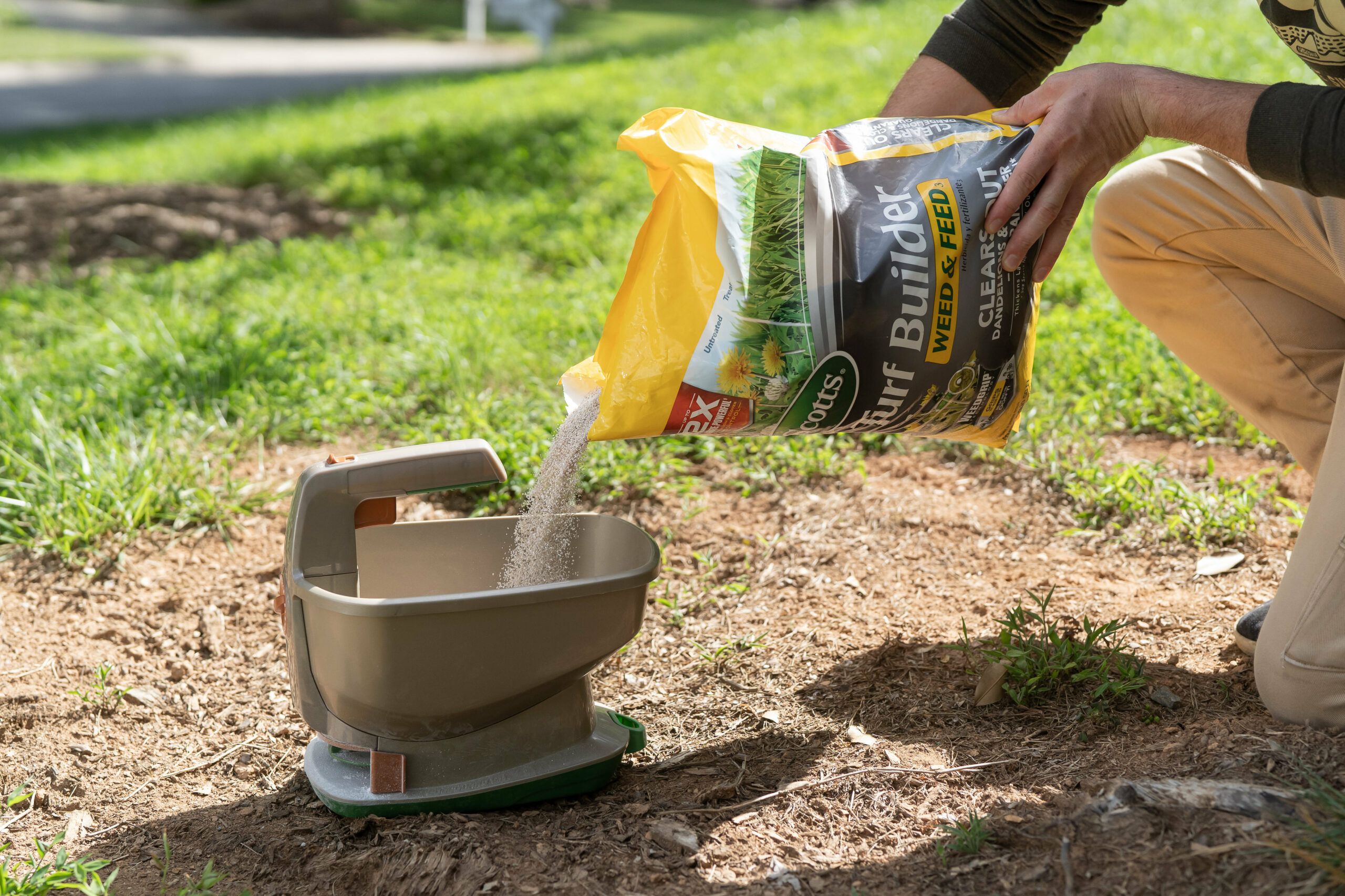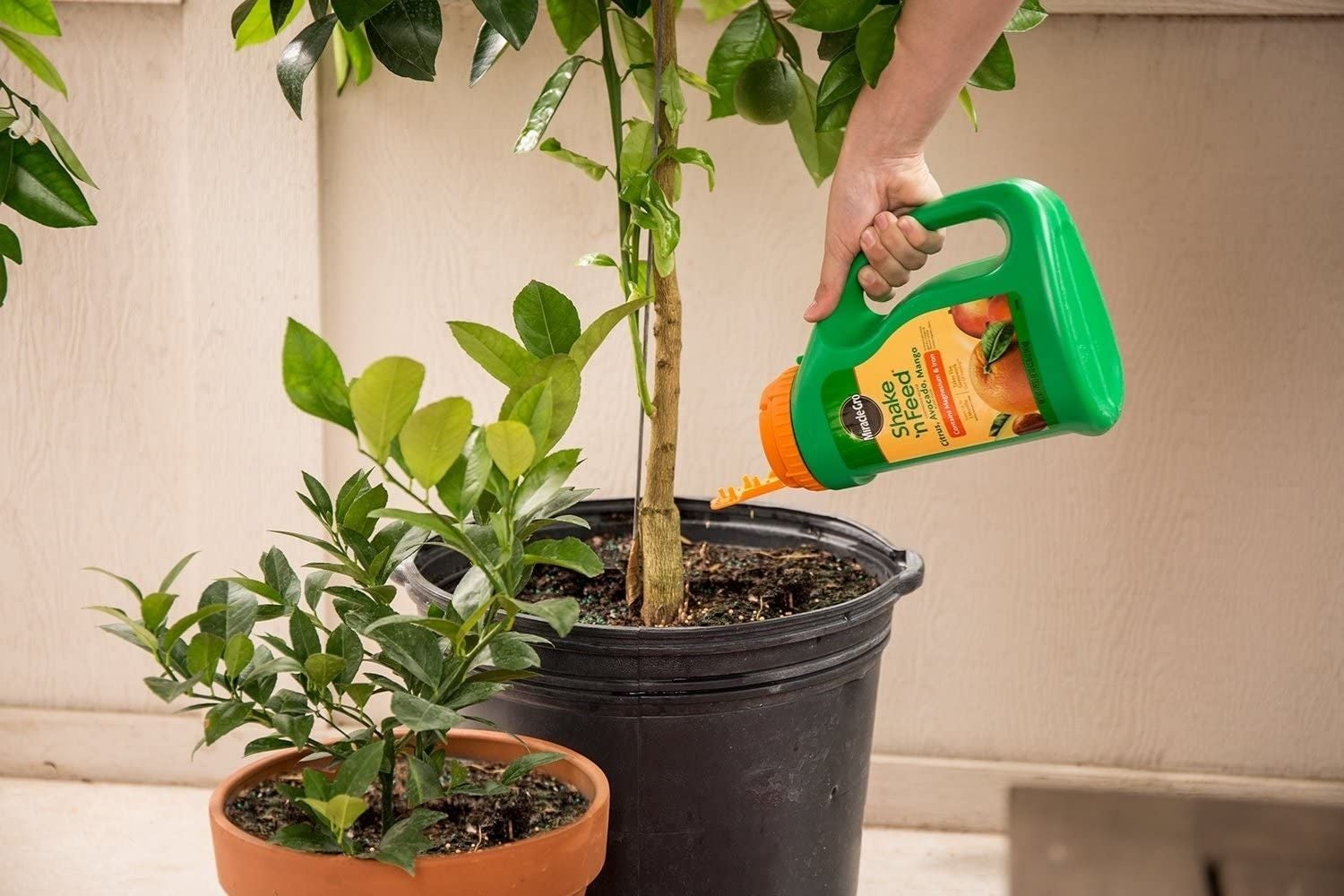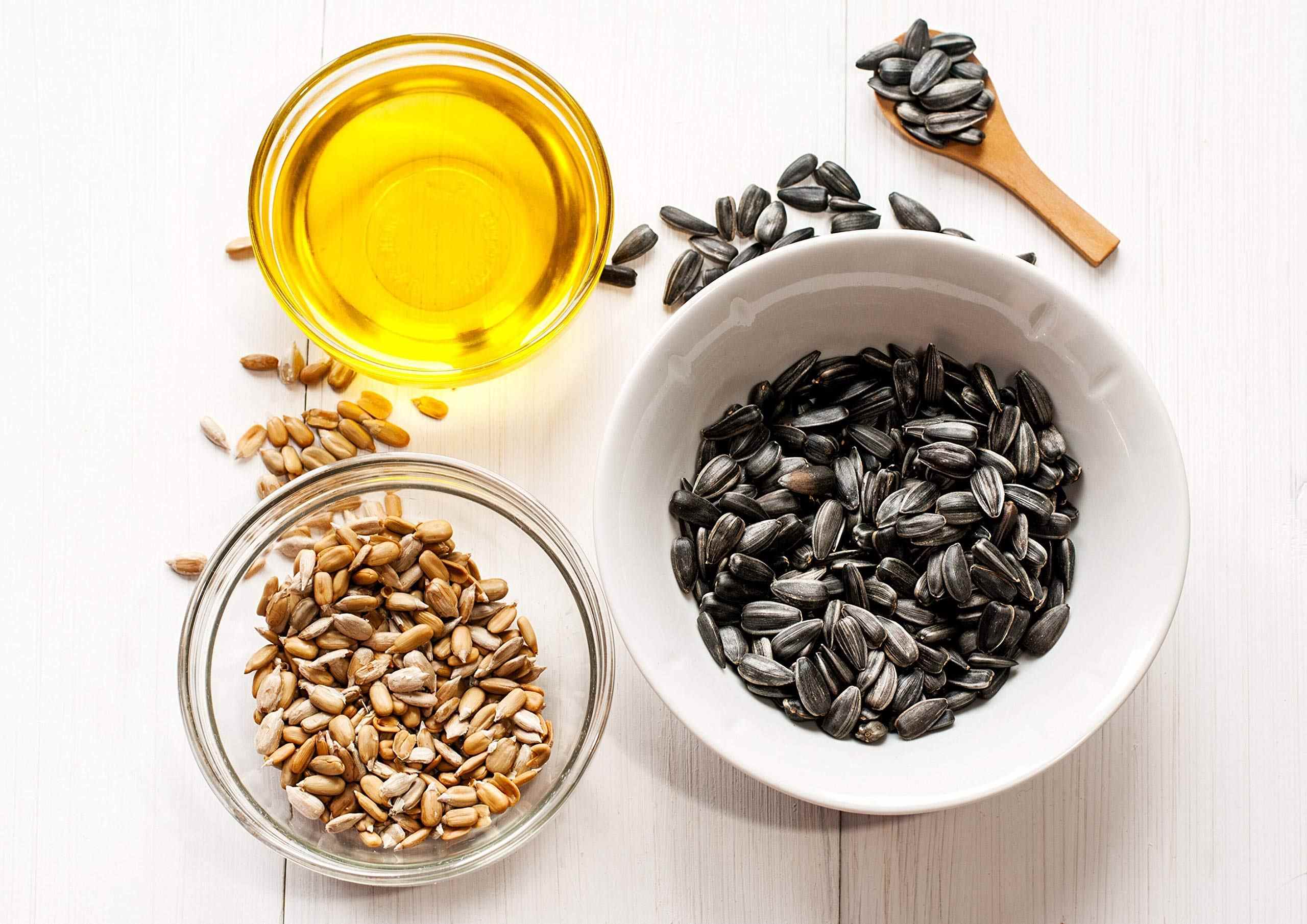Home>Types of Gardening>Ornamental Gardening>What Fertilizer Is Best For Sunflowers


Ornamental Gardening
What Fertilizer Is Best For Sunflowers
Modified: January 22, 2024
Discover the ideal fertilizer for sunflowers and boost your ornamental gardening game. A comprehensive guide to the best fertilizers for stunning sunflower blooms.
(Many of the links in this article redirect to a specific reviewed product. Your purchase of these products through affiliate links helps to generate commission for Chicagolandgardening.com, at no extra cost. Learn more)
Table of Contents
- Introduction
- Benefits of using fertilizer for sunflowers
- Factors to consider when choosing fertilizer for sunflowers
- Organic fertilizers for sunflowers
- Inorganic fertilizers for sunflowers
- NPK ratios and their significance for sunflower growth
- Recommended fertilizers for sunflowers
- Application methods for sunflower fertilizers
- Precautions and best practices for fertilizing sunflowers
- Conclusion
Introduction
Ornamental gardening is a wonderful hobby that allows individuals to create stunning displays of nature’s beauty. Within the realm of ornamental gardening, one particular type of plant stands out for its vibrant colors, towering height, and overall majestic presence – the sunflower. Known for their iconic large yellow flowers, sunflowers bring joy and warmth to any garden or landscape.
While sunflowers are resilient and can thrive in various conditions, providing the right nutrients through fertilization is essential for their optimal growth and development. Fertilizers play a vital role in supplying sunflowers with the necessary nutrients they need to produce healthy foliage and vibrant blooms.
In this article, we will delve into the world of sunflower fertilization and explore the different types of fertilizers available, along with their benefits and recommended application methods. Whether you are a seasoned gardener looking to enhance your sunflower garden or a beginner taking your first steps in ornamental gardening, this guide has got you covered.
Benefits of using fertilizer for sunflowers
Fertilizing sunflowers offers a myriad of benefits that contribute to their overall health, vigor, and blooming potential. Let’s explore the advantages of using fertilizer for sunflowers:
- Promotes Healthy Growth: Sunflowers are heavy feeders, meaning they require an ample supply of nutrients to grow optimally. Fertilizers provide sunflowers with essential macronutrients such as nitrogen (N), phosphorus (P), and potassium (K), which are vital for promoting healthy root development, sturdy stems, and lush foliage.
- Enhances Blooming: Proper fertilization helps sunflowers produce an abundance of vibrant, eye-catching blooms. Phosphorus, in particular, plays a crucial role in flower formation and the overall quantity and quality of sunflower blossoms. By providing a balanced fertilizer, you can ensure that your sunflowers will bloom profusely and impressively.
- Increases Seed Production: Sunflowers are known for their valuable seeds, which are not only a tasty snack but also a source of oil. Fertilizing sunflowers aids in seed production by providing them with the necessary nutrients for healthy seed development. Adequate fertilization can result in larger seed size and higher seed yields, making your sunflower garden even more rewarding.
- Improves Disease Resistance: Well-nourished sunflowers are more resilient to diseases and pests. Fertilizers containing micronutrients like zinc and iron can strengthen sunflowers’ immune systems, making them less susceptible to common plant ailments. By incorporating fertilization into your sunflower care routine, you can help your plants combat diseases and thrive in various environmental conditions.
- Enhances Overall Appearance: Sunflowers are admired for their striking beauty and graceful stature. Regular fertilization ensures that your sunflowers will have vibrant green foliage, sturdy stems, and large, healthy flowers. Well-fed sunflowers not only stand tall and proud but also add a captivating touch to your garden or landscape, turning it into a breathtaking sight.
By incorporating fertilizer into your sunflower gardening routine, you can enjoy these benefits while helping your sunflowers reach their full potential. However, it is essential to choose the right fertilizer for your sunflowers and apply it correctly to maximize its efficacy. In the following sections, we will explore the factors to consider when choosing fertilizers for sunflowers and discuss the different types of fertilizers available.
Factors to consider when choosing fertilizer for sunflowers
Choosing the right fertilizer for your sunflowers is crucial to provide them with the specific nutrients they need for optimal growth. Here are some factors to consider when selecting a fertilizer for your sunflowers:
- Nutrient Content: Sunflowers have specific nutrient requirements, with nitrogen, phosphorus, and potassium being the most essential. Look for fertilizers with a balanced NPK ratio, such as 10-10-10 or 20-20-20, to ensure your sunflowers receive a well-rounded nutrient supply. Additionally, pay attention to the micronutrient content in fertilizers, as certain trace elements like iron, zinc, and magnesium are vital for sunflower growth.
- Soil Composition: Take into account the existing soil composition in your garden. Conduct a soil test to determine the pH level and nutrient deficiencies or excesses. If your soil is deficient in certain nutrients, choose a fertilizer that addresses those specific deficiencies. Conversely, if your soil has an abundance of certain nutrients, opt for a fertilizer with a lower or zero content of those nutrients.
- Growth Stage: Consider the growth stage of your sunflowers when selecting a fertilizer. Young sunflowers in their early growth stages may benefit from fertilizers with higher nitrogen content to encourage leaf and stem development. As the sunflowers enter the flowering stage, phosphorus-rich fertilizers can promote robust bloom formation.
- Organic vs. Inorganic: Decide whether you prefer organic or inorganic fertilizers. Organic fertilizers, such as compost, manure, or organic-based granular fertilizers, are derived from natural sources and provide slow-release nutrients to the soil. Inorganic or synthetic fertilizers, on the other hand, offer precise nutrient formulations and faster results. Determine which type aligns with your gardening principles and suits your specific needs.
- Application Method: Consider the ease of application when selecting a fertilizer. Liquid fertilizers can be applied directly to the soil or foliar sprayed for quick absorption, while granular or slow-release fertilizers require incorporation into the soil. Choose a fertilizer that suits your preferred application method and is convenient for the size of your sunflower garden.
By taking these factors into account, you can make an informed decision and choose the most suitable fertilizer for your sunflowers. Remember that every sunflower garden is unique, and adjusting fertilizer choice and application as per your specific garden requirements can lead to healthier and more robust sunflowers.
Organic fertilizers for sunflowers
Organic fertilizers are a popular choice among gardeners who prefer natural and sustainable gardening practices. They offer numerous benefits for sunflowers and the overall health of the soil. Here are some organic fertilizers suitable for sunflowers:
- Compost: Compost is an excellent organic fertilizer for sunflowers, as it enriches the soil with a wide range of nutrients. It improves soil structure, retains moisture, and promotes beneficial microbial activity, creating a favorable environment for sunflower growth.
- Manure: Well-aged animal manure, such as cow or horse manure, is rich in essential nutrients and organic matter. It releases nutrients slowly, providing a steady supply of nourishment to sunflowers. Ensure that the manure is well-composted or aged to avoid burning the plants, as fresh manure can be too high in nitrogen and harm sunflowers.
- Bone Meal: Bone meal is a slow-release fertilizer derived from ground animal bones. It is an excellent source of phosphorus, which stimulates strong root growth and abundant flowering in sunflowers. Use bone meal when planting sunflower seeds or incorporate it into the soil around established plants.
- Fish Emulsion: Fish emulsion is a liquid organic fertilizer made from fish waste. It is rich in nitrogen, making it ideal for giving sunflowers a quick boost during their vegetative growth stage. Dilute fish emulsion according to the package instructions and apply it to the soil around the sunflowers.
- Alfalfa Meal: Alfalfa meal is a natural fertilizer made from fermented alfalfa plants. It contains moderate levels of nitrogen, phosphorus, and potassium, as well as trace minerals. Alfalfa meal improves soil structure, enhances nutrient absorption, and stimulates overall plant growth.
- Seaweed Extract: Seaweed extract is derived from various types of seaweed and is rich in trace minerals, amino acids, and growth-promoting hormones. It stimulates root development, increases plant resistance to stress, and improves nutrient uptake in sunflowers. Dilute the seaweed extract and apply it as a foliar spray or soil drench.
Organic fertilizers provide a slow and steady release of nutrients, improving soil fertility and creating a more sustainable growing environment for sunflowers. They also foster a healthy microbial population in the soil, promoting nutrient cycling and overall soil health. Incorporating organic fertilizers into your sunflower care routine can result in thriving plants and a more eco-friendly gardening approach.
Inorganic fertilizers for sunflowers
Inorganic or synthetic fertilizers are formulated to provide sunflowers with specific nutrient ratios. They offer precise control over nutrient levels and rapid results. Here are some commonly used inorganic fertilizers for sunflowers:
- Complete NPK Fertilizers: Complete fertilizers, such as 10-10-10 or 20-20-20, contain a balanced ratio of nitrogen (N), phosphorus (P), and potassium (K). They are readily available and provide sunflowers with the essential macronutrients required for overall growth and development.
- Slow-Release Fertilizers: Slow-release fertilizers gradually release nutrients over an extended period, ensuring a constant supply for sunflowers. They are often coated with a polymer or resin that controls the nutrient release rate. Slow-release fertilizers are ideal for those who prefer a more hands-off approach to fertilizing, as they require less frequent application.
- Water-Soluble Fertilizers: Water-soluble fertilizers come in powdered or granular form and are dissolved in water before application. They provide an immediate nutrient boost to sunflowers and are quickly absorbed through the roots. Water-soluble fertilizers are particularly useful for remedying nutrient deficiencies or providing a quick nutrient uptake during the growing season.
- Foliar Fertilizers: Foliar fertilizers are liquid fertilizers that are applied directly to the sunflower leaves. They are absorbed through the foliage, allowing for rapid nutrient uptake. Foliar fertilizers are useful when sunflowers require an instant nutrient boost or when soil conditions hinder nutrient absorption.
- Garden Sulfur: Sulfur is an inorganic fertilizer used to lower soil pH levels. If your soil is alkaline and sunflowers prefer slightly acidic conditions, applying garden sulfur can help create a more suitable environment for their growth. Follow the package instructions for the correct application rate.
- Micronutrient Fertilizers: Micronutrient fertilizers contain trace elements like iron, zinc, manganese, and copper, which are essential for sunflower growth and development. They can be used to address specific micronutrient deficiencies identified through soil tests. Apply micronutrient fertilizers according to the package instructions to prevent nutrient imbalances.
Inorganic fertilizers provide precise and targeted nutrient delivery, ensuring that sunflowers receive the appropriate nutrients at the right time. They are efficient and convenient options for maintaining optimal growth and bloom quality in sunflowers. However, it’s important to follow the recommended application rates and frequency to avoid nutrient excesses or imbalances that can harm the plants.
NPK ratios and their significance for sunflower growth
Nitrogen (N), phosphorus (P), and potassium (K) are the three primary macronutrients that sunflowers require for healthy growth. The ratio of these nutrients, commonly referred to as the NPK ratio, plays a significant role in sunflower development and overall vigor.
Nitrogen (N): Nitrogen is essential for promoting lush green foliage, strong stems, and overall plant growth. It is responsible for enhancing sunflowers’ ability to photosynthesize and convert sunlight into energy. Sunflowers require a sufficient supply of nitrogen throughout their growth stages. However, excessive nitrogen can lead to excessive vegetative growth, delaying flowering and affecting overall plant balance.
Phosphorus (P): Phosphorus is crucial for sunflower bloom formation, root development, and overall plant vigor. It plays an essential role in energy transfer within the plant, aiding in the production of flowers, seeds, and healthy root systems. Sunflowers benefit from a higher phosphorus content during their blooming stage to stimulate robust flower production.
Potassium (K): Potassium is responsible for various physiological processes in sunflowers, including water regulation, disease resistance, and nutrient uptake. It plays a vital role in enhancing overall plant health, enabling sunflowers to withstand stressful conditions such as drought, extreme temperatures, and pest attacks. Potassium also contributes to the production of sturdy stems and improved seed quality.
The NPK ratio on fertilizer labels represents the respective percentage of nitrogen, phosphorus, and potassium present in the product. For sunflowers, a balanced NPK ratio, such as 10-10-10 or 20-20-20, is often suitable for providing a well-rounded nutrient supply throughout their growth stages.
During the vegetative stage, sunflowers benefit from higher nitrogen content to encourage foliage growth and root development. Fertilizers with a higher nitrogen ratio, such as 15-5-10, can be applied during this phase. As sunflowers transition to the flowering stage, a shift towards a higher phosphorus ratio, such as 5-20-10, is recommended to promote abundant and vibrant blooms.
It is important to note that the specific NPK ratio requirement may vary based on factors such as soil fertility, sunflower variety, and environmental conditions. Conducting soil tests and observing the plant’s response can provide valuable insights into adjusting the NPK ratio accordingly.
By understanding the significance of NPK ratios and selecting the appropriate fertilizer with the desired NPK balance, you can effectively support sunflower growth at each stage of their life cycle and ensure healthy, robust plants.
Recommended fertilizers for sunflowers
Choosing the right fertilizer for your sunflowers can greatly impact their growth and overall health. Here are some recommended fertilizers that are well-suited for nurturing sunflowers:
- Organic-Based Fertilizers: Organic-based fertilizers, such as Espoma Flower-tone or Jobe’s Organics All Purpose Fertilizer, are excellent choices for those who prefer organic gardening methods. These fertilizers contain a blend of organic materials and essential macronutrients, providing a slow release of nourishment for sunflowers.
- Slow-Release Fertilizers: Osmocote Flower and Vegetable Smart-Release Plant Food or Schultz Slow-Release Bloom Fertilizer are examples of slow-release fertilizers that provide a steady supply of nutrients to sunflowers over an extended period. These fertilizers are convenient, requiring less frequent applications compared to traditional granular or water-soluble fertilizers.
- Water-Soluble Fertilizers: Miracle-Gro Water Soluble All Purpose Plant Food or Jack’s Classic All Purpose Water Soluble Plant Food are popular options for sunflower enthusiasts who prefer quick results. These fertilizers dissolve in water, allowing for rapid nutrient absorption through the sunflowers’ roots.
- Granular Fertilizers: Granular fertilizers, such as Jobe’s Organics All Purpose Granular Fertilizer or Scotts Super Bloom Water Soluble Plant Food, are easy to apply and provide a slow release of nutrients. They can be incorporated into the soil before planting or applied as a top dressing around established sunflowers.
- Nutrient-Specific Fertilizers: Nutrient-specific fertilizers, such as Bonide Liquid Iron Plant Food or Hi-Yield Triple Super Phosphate, are beneficial when addressing specific nutrient deficiencies in sunflowers. These fertilizers provide targeted nutrients to rectify imbalances identified through soil tests.
- Organic Amendments: Organic amendments, such as well-composted manure or compost, can enrich the soil with a variety of nutrients and improve its structure. These amendments gradually release nutrients and help create a healthy environment for sunflower growth. Incorporate them into the soil before planting or apply as a top dressing during the growing season.
Keep in mind that the specific fertilizer and application rate may vary depending on the soil type, sunflower variety, and environmental factors. It is advisable to follow the manufacturer’s instructions on the packaging and adjust the application rate based on the specific needs of your sunflowers.
Regularly monitor your sunflowers for signs of nutrient deficiencies or excessive growth. Adjusting the type and frequency of fertilizer applications based on your observations will help you maintain optimal nutrient levels and ensure healthy, thriving sunflowers.
Application methods for sunflower fertilizers
The application of fertilizers plays a crucial role in delivering essential nutrients to sunflowers for optimal growth and development. Here are some common methods for effectively applying fertilizers to sunflowers:
- Soil Incorporation: This method involves mixing granular or slow-release fertilizers into the soil before planting or during the growing season. Create furrows or holes around the base of the sunflowers and distribute the fertilizer evenly. Carefully cover the fertilizer with soil and water thoroughly to ensure proper nutrient absorption.
- Top-Dressing: Top-dressing involves applying granular or organic fertilizers on the soil surface around the sunflowers. Ensure that the fertilizer is spread evenly and avoid direct contact with the stems or leaves to prevent potential burn. Water thoroughly after application to help the nutrients reach the root zone.
- Foliar Spray: Foliar spraying involves applying liquid fertilizers directly to the sunflower leaves. Dilute the fertilizer as per the manufacturer’s instructions and use a sprayer to evenly coat the foliage. This method allows for quick absorption of nutrients and can be particularly beneficial when sunflowers require an immediate nutrient boost.
- Injection/Fertigation: Injection or fertigation is a method commonly used in large-scale or commercial sunflower production. It involves injecting liquid fertilizers directly into the irrigation system, allowing for a consistent and controlled nutrient application throughout the growing season.
When choosing an application method, consider the type of fertilizer, soil moisture levels, and the growth stage of the sunflowers. It is essential to follow the manufacturer’s instructions and adhere to the recommended application rates and frequencies to avoid nutrient imbalances or damage to the plants.
Additionally, proper watering is crucial after fertilizer application to help dissolve and distribute the nutrients to the root zone. Irrigate the sunflowers deeply and evenly to ensure that the fertilizers penetrate the soil and reach the plant’s roots effectively.
Regular observation of your sunflowers is also important to monitor their response to the fertilizers. Watch for signs of nutrient deficiencies or excesses, such as yellowing leaves or stunted growth. Adjust the fertilizer application as needed based on these observations to maintain a healthy nutrient balance for your sunflowers.
Remember, each sunflower garden is unique, and different application methods may work better depending on the specific conditions. Experimentation and careful observation will help you determine the most effective application method for your sunflowers.
Precautions and best practices for fertilizing sunflowers
Fertilizing sunflowers can help them thrive, but it’s important to follow precautions and best practices to ensure the safety and health of both the plants and the environment. Here are some guidelines to consider when fertilizing sunflowers:
- Read and follow instructions: Always read and carefully follow the instructions provided by the fertilizer manufacturer. Pay attention to the recommended application rates, timing, and frequency to avoid over or under-fertilization.
- Avoid excessive fertilization: Over-fertilizing sunflowers can result in nutrient imbalances, excessive vegetative growth, and reduced blooming. Follow the recommended dosage and avoid applying more fertilizer than necessary.
- Apply fertilizers at the right time: Sunflowers have different nutrient requirements at various growth stages. Apply fertilizers during the appropriate stage to meet their specific needs. For example, apply a higher phosphorus fertilizer when sunflowers are in their blooming phase.
- Water properly: Watering is crucial for nutrient absorption and preventing fertilizer burn. After applying fertilizers, water the sunflowers thoroughly to ensure the nutrients reach the root zone. Avoid heavy watering immediately after application to prevent nutrient leaching.
- Protect leaves and stems: Take care not to allow fertilizer to directly contact the leaves and stems of the sunflowers. This can cause burn or damage to the plant tissue. Apply fertilizers around the base of the plants or use foliar spraying techniques if necessary.
- Monitor for signs of nutrient deficiencies: Regularly observe the sunflowers for any signs of nutrient deficiencies or excesses, such as yellowing leaves, stunted growth, or nutrient-specific symptoms. Adjust fertilizer application based on these observations to maintain a healthy nutrient balance.
- Consider environmental impact: Be mindful of the environmental impact of fertilizers. Avoid applying fertilizers near water bodies to prevent nutrient runoff. Respect local regulations and recommendations for the use of fertilizers to minimize harm to the surrounding environment.
- Soil testing: Conduct periodic soil tests to assess the nutrient levels and pH of the soil. This can help determine if any specific nutrient amendments are needed and prevent unnecessary or incorrect fertilizer applications.
Following these precautions and best practices will help ensure the proper and effective fertilization of sunflowers. Additionally, maintaining good overall sunflower care practices, such as proper watering, weed control, and pest management, will contribute to the overall success and health of your sunflowers.
Remember, each sunflower garden is unique, and it may take some experimentation and adjustments to find the best fertilizer and application approach that suits your specific garden conditions and sunflower varieties.
Conclusion
Fertilizing sunflowers is an essential aspect of maintaining their health, vigor, and blooming potential. By providing the right nutrients at the right time, you can help your sunflowers thrive and create a stunning display in your garden or landscape.
When choosing fertilizers for sunflowers, consider the nutrient requirements, soil composition, and growth stage of the plants. Organic fertilizers, such as compost and manure, offer sustainable and slow-release nutrient supply, while inorganic fertilizers provide precise control over nutrient ratios.
Applying fertilizers properly is crucial for optimal results. Whether you choose to incorporate fertilizers into the soil, top-dress around the plants, or use foliar spraying techniques, following instructions, and best practices will ensure effective nutrient absorption and minimize potential harm to the plants or environment.
Regular observation and adjustments based on the sunflowers’ responses to fertilization will help you maintain a healthy nutrient balance and prevent nutrient deficiencies or excesses. Factors such as soil testing, proper watering, and environmental considerations also contribute to successful sunflower care.
In the end, fertilizing sunflowers is just one part of the overall care that these majestic plants require. With attention to their nutrient needs, along with other essential care practices, you can enjoy a garden filled with vibrant, towering sunflowers that bring joy and beauty to your outdoor space.










